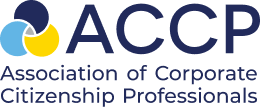ACCP President and CEO Carolyn Berkowitz appeared on Carol Cone’s Purpose 360 podcast earlier this year to provide advice and insights relevant to the current state of CSR and ESG.
Over several blog posts, we highlight some of the discussion between Carolyn and Carol that didn’t make it into the final podcast.
Our previous blogs in the series focused on the role and function of social responsibility within a company and the importance of racial equity in the field.
This post shares Carolyn’s advice to companies and those working in the field.
Many of our listeners are young professionals and students. What advice would you give them as they start their careers and purpose journeys?
Build your network. It is difficult to break into this field because open positions are rare. Curate a network and a community for learning and access.
Remember that you can engage in this work from any position in the company. Volunteer your expertise, serve on councils, or as an ambassador. Engage in your ERGs. Beyond that, think about your team’s work and how you can make your role more socially responsible – whether it is developing a new product, creating AI, or serving as legal counsel.
Finally, idealism is a great motivator but needs to be tempered with value for the business. Consider your setting, think in business terms, and communicate first from the business perspective. Listen carefully to what the company is saying between the lines. Know and own your “why” and share it when appropriate.
But also know that your “why” is not why you’ll be hired or promoted. What you bring to the table – your skills, strategic thinking, experience, and ethics – are much more critical to the company than your idealism.
Please share your 2-3 top insights for peers along their purpose and community engagement journeys.
To strategically align with the business, you must know the business your company is in and the issues it is facing. Otherwise, your programs won’t create business results or be sustainable. Stay current on ESG and CSR; it is changing very rapidly.
Communicate – well and often. Be bilingual (business speak and community speak) for your different audiences. Remember the mantra “Numbers and Stories” and provide both data (head) and impact stories (heart). Have a pitch ready and take every opportunity to use it – they call it an elevator pitch for a reason.
This is a long game, and your company measures quarterly success. Stick with it, don’t get discouraged, and remember that great ideas always come back.
What resources, such as news outlets, podcasts, and leaders, do you turn to for inspiration and information?
I read all the articles on CSR and ESG that are out there, and I find them on Forbes, Harvard Business Review, Fast Company, 3BL, and LinkedIn, to name a few. I read all the relevant research as soon as I can get my hands on it. And our ~250 members are a huge source of inspiration and information.
I often get inspiration from outside the field and other disciplines that I can apply to my work. For example, I listen to an NPR podcast, Hidden, hosted by Shankar Vedantom. It’s a science-based podcast about human behavior and is always relevant for insight into social constructs, changing minds, and self-awareness. I’m also inspired by authors like Brene Brown on leadership and Bryan Stevenson on equity.
Can you share ACCP resources available to listeners for learning and collaboration?
ACCP has lots to offer whether or not you work in a member company.
On the CSR Resources page of our website, you’ll find original research that is practically oriented rather than academically written on Equity in CSR, CSR Insights and trends, and ERGs.
We also publish a report each year called Making the Case for Corporate Social Impact that aggregates critical data from 50+ recent studies and aligns data and infographics with business value.
Most months, we have free webinars open to the public and convene a leading Annual Conference and trainings that practitioners can pay to attend.
For members of the organization, there are also online communities, on-demand consulting, a resource library, a monthly peer network meeting on trending topics, member groups, and benchmarking data.
We differentiate ourselves from peer organizations by focusing on curating relationships that fuel our generous peer community, creating knowledge, sharing trends, and hosting educational programs that are accessible and practical.
Click here for the full podcast. We will be highlighting more of Carolyn’s episode in upcoming blogs.

